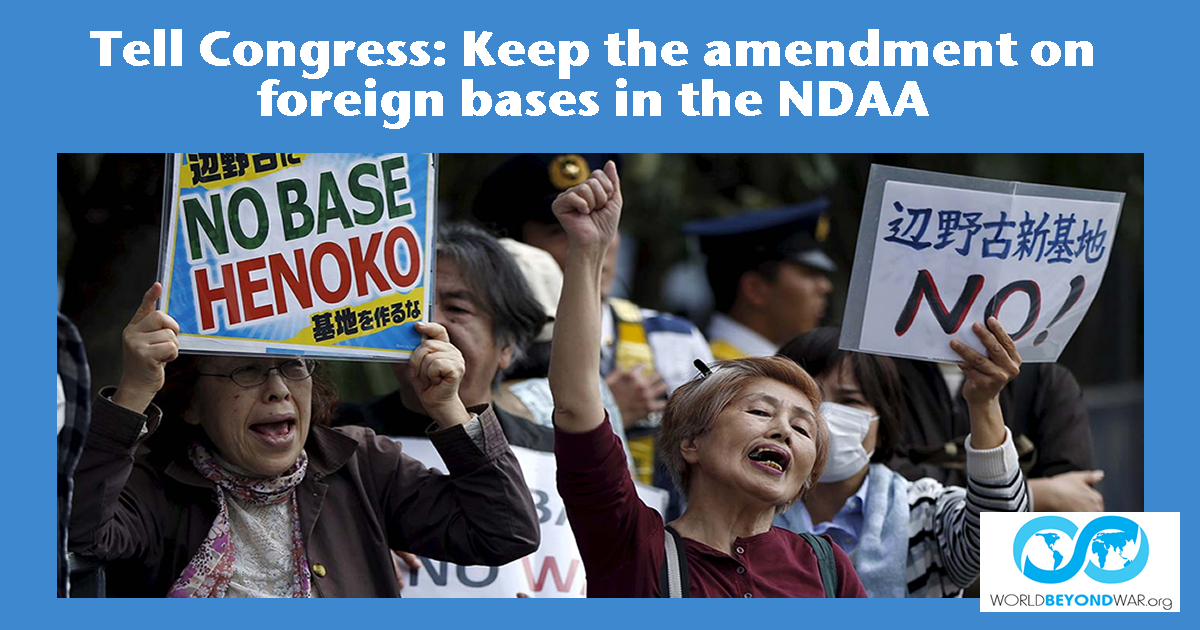Now, as the House and Senate reconcile their two versions of the bill, they need to know that we want this amendment left in it.
CLICK HERE TO EMAIL YOUR REPRESENTATIVE AND SENATORS.

Here is the text of the amendment as passed:
At the end of subtitle G of title X, insert the
following: SEC. 10. REPORT ON FINANCIAL COSTS OF OVERSEAS UNITED STATES
MILITARY POSTURE AND OPERATIONS. Not later than March 1, 2020, the
Secretary of Defense shall submit to the congressional defense
committees a report on the financial costs and national security
benefits of each of the following for fiscal year 2019: (1) Operating,
improving, and maintaining overseas military infrastructure at
installations included on the enduring location master list, including
adjustments that take into account direct or in-kind contributions made
by the host nations of such enduring locations. (2) Operating,
improving, and maintaining overseas military infrastructure supporting
forward-deployed forces at overseas contingency locations, including
adjustments that take into account direct or in-kind contributions made
by the host nations of such enduring locations. (3) Overseas military
operations, including support to contingency operations, rotational
deployments, and training exercise.
In this video
from C-Span, at 5:21, Rep. Omar makes the case for a need to justify
foreign military bases, not just blindly fund unlimited and unknown
empire. At 5:25 Rep. Adam Smith makes the case as well. One of their
colleagues argues in opposition, but it’s difficult to find coherent
meaning in what he says, and it’s hard to imagine what a persuasive case
could be for the 210 No votes recorded. What could be the advantage of
coating the globe with military bases without bothering to know what
each one costs or whether each one plausibly makes you safer or actually
endangers you?
The closing of U.S. bases and the removal of U.S. military personnel are critical to the elimination of war.

The United States has more than 150,000 military troops deployed outside the United States on more than 800 bases (some estimates are more than 1000)
in 160 countries, and all 7 continents. These bases are the central
feature of U.S. foreign policy which is one of coercion and threat of
military aggression. The U.S. uses these bases in a tangible way to
preposition troops and weaponry in the event they are “needed” at a
moment’s notice, and also as a manifestation of U.S. imperialism and
global domination — a constant implicit threat. Additionally, because of
a history of military aggression, countries with U.S. bases are targets
for attack.
There are two principal problems with foreign military bases:
- All these facilities are integral to preparations for war, and as
such undermine international peace and security. The bases serve to
proliferate weapons, increase violence, and undermine international
stability.
- Bases cause social and environmental problems at a local level.
Communities living around the bases often experience high levels of
rapes committed by foreign soldiers, violent crimes, loss of land or
livelihood, and pollution and health hazards caused by the testing of
conventional or non-conventional weapons. In many countries the
agreement that permitted the base stipulates that foreign soldiers who
perpetrate crimes can not be held accountable.
The closing of U.S. foreign military bases in particular (they make
up the vast majority of all foreign military bases) would have a
significant effect on global perceptions, and represent a massive shift
in foreign relations. With each base closure, the U.S. would become less
of a threat. Relations with host countries would be improved as the
base real estate and facilities are rightfully returned to local
governments. Because the United States is far and away the most powerful
and aggressive military in the world, the closing of foreign bases
would represent an easing of tensions for everyone. If the U.S. makes
such a gesture, it may induce other countries to address their own
foreign and military policies.
In the map below, every color but gray indicates the permanent basing
of some number of U.S. troops, not counting special forces and
temporary deployments. For details, go here.
CLICK HERE.

Share on Facebook.
Share on Twitter.
Like on Instagram.
World BEYOND War is a global network of volunteers, activists, and allied organizations advocating for the abolition of the very institution of war. Our success is driven by a people-powered movement –
support our work for a culture of peace.